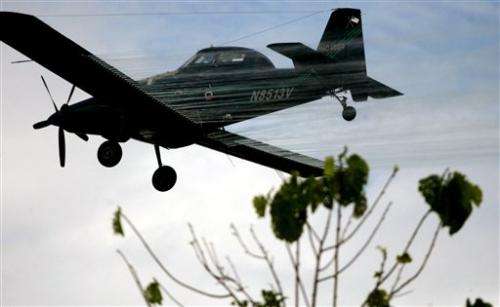Colombia drug debate revived as herbicide deemed carcinogen

The new labeling of the world's most-popular weed killer as a likely cause of cancer is raising more questions for an aerial spraying program in Colombia that is the cornerstone of the U.S.-backed war on drugs.
The International Agency for Research on Cancer, a French-based research arm of the World Health Organization, has reclassified the herbicide glyphosate as a result of what it said is convincing evidence the chemical produces cancer in lab animals and more limited findings it causes non-Hodgkin's lymphoma in humans.
The ruling on Thursday is likely to send shockwaves around the globe, where the glyphosate-containing herbicide Roundup is a mainstay of industrial agriculture.
In Colombia, there is an added political dimension stemming from the fierce debate that has raged over a program that has sprayed more than 4 million acres of land in the past two decades to kill coca plants, whose leaves are used to produce cocaine.
The fumigation program, which is financed by the U.S. and partly carried out by American contractors, has long been an irritant to Colombia's left, which likens it to the U.S. military's use of the Agent Orange herbicide during the Vietnam War. Ending Colombia's spraying program has also been a demand of leftist rebels negotiating with the government on an accord to end the country's half-century armed conflict.
Daniel Mejia, a Bogota-based economist who is chairman of an expert panel advising the Colombian government on its drug strategy, said the new report is by far the most authoritative and could end up burying the fumigation program.
"Nobody can accuse the WHO of being ideologically biased," Mejia said, noting that questions already had been raised about the effectiveness of the spraying strategy and its potential health risks. A paper he published last year, based on a study of medical records between 2003 and 2007, found a higher incidence of skin problems and miscarriages in districts targeted by aerial spraying.
But Mejia cautioned that while he favors ending aerial spraying, there hasn't been a consensus for that move on the advisory panel he leads.
Mejia's concerns were echoed by Colombia's ombudsman office, which said it would request the suspension of the spraying program if the WHO results are convincing.
The U.S. government, which has seen American pilots shot down on the drug flights, says damage to the environment and health risks from production of cocaine far outweigh the adverse effects of aerial eradication. It's a position Colombia shares.
"Without a doubt this reopens the debate on fumigation and causes us to worry," Health Minister Alejandro Gaviria told The Associated Press on Saturday. "But these are interests here that transcend" science.
Monsanto and other manufacturers of glyphosate-containing products strongly rejected the new WHO ruling, pointing to a U.S. Environmental Protection Agency ruling from 2012 determining the herbicide is safe.
Colombia has already been scaling back fumigation in favor of manual eradication efforts amid mounting criticism spraying generates ill-will among farmers that the state is trying to protect from armed groups.
Aerial spraying last year was around 55,000 hectares (136,000 acres), down from a peak of 172,000 hectares (425,000 acres) in 2006. And even opponents of the program say the government has made strides improving safety, such as not spraying in strong winds to avoid chemical drift and installing GPS devices on fumigation planes so farmers' claims of injury can be promptly investigated.
In 2013, Colombia agreed to pay Ecuador $15 million to settle a lawsuit over economic and human damage tied to spraying along the countries' border.
Gen. Ricardo Restrepo, head of the anti-narcotics police, said that he had not yet seen WHO's new warning and that the spraying program is operating as usual.
"My job is to carry out the strategy," he said.
© 2015 The Associated Press. All rights reserved.
















